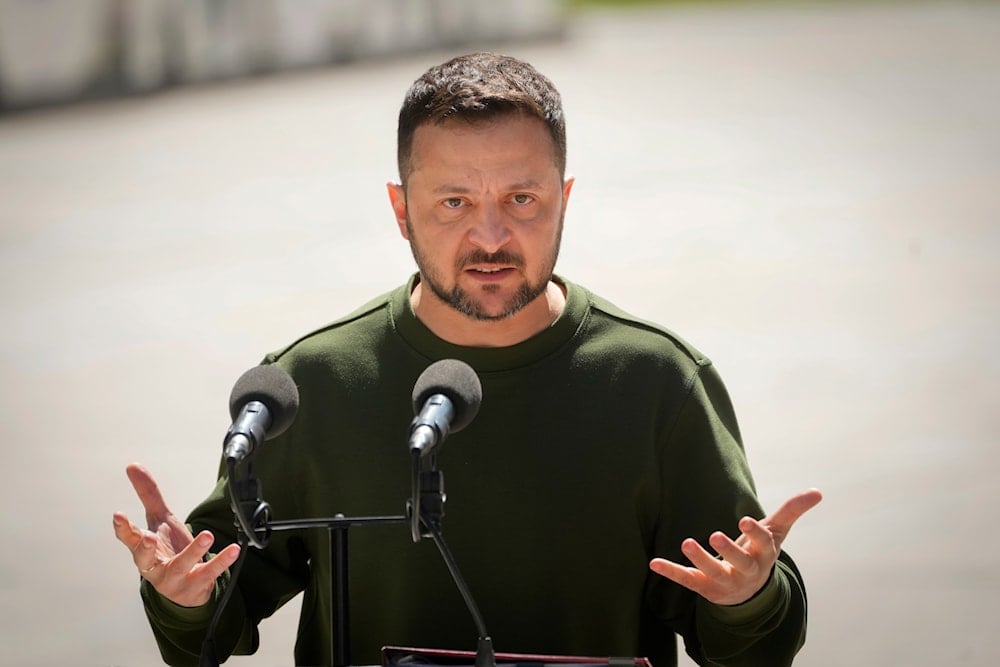Zelensky fires special ops commander for the second time in six months
Ukrainian President Volodymyr Zelensky fires the commander of his special forces and replaces him in the second incident of the sort in six months.
-

Ukrainian President Volodymyr Zelensky talks during a joint press conference with European Parliament President Roberta Metsola in Kiev, Ukraine, May 9, 2024. (AP)
Ukrainian President Volodymyr Zelensky has initiated a significant overhaul within the country's special forces, announcing the replacement of Colonel Serhiy Lupanchuk with Brigadier General Oleksandr Trepak as the unit's new commander.
This change, revealed through an official memo on the president's website on May 9, marks the second leadership transition in this crucial unit within the span of six months.
While the decrees issued by President Zelensky provided no explicit explanation for Colonel Lupanchuk's dismissal and Brigadier General Trepak's appointment, Trepak's extensive military background could likely have had a hand in this change.
Brigadier General Oleksandr Trepak actively participated in the war in the Donbass region since 2014.
This change in leadership comes amid broader restructuring within the Ukrainian military's chain of command. Since February, Zelensky has implemented several changes at various levels, including the replacement of General Valeriy Zaluzhnyi with then-Ground Forces Commander Oleksandr Syrskyi as the top commander.
These moves are part of a broader effort to "reboot" the military system by bringing in experienced commanders adept at navigating the many challenges faced by the Ukrainian forces as they continue to lose drastically in the face of the Russian push.
Zaluzhny out
Ukraine's Defense Minister Rustem Umerov announced on February 8 the removal of the country's leading commander, Valery Zaluzhny, who has overseen Kiev's forces during the war in the country.
"Today, a decision was made to change the leadership of the Armed Forces of Ukraine. I am sincerely grateful to Valery Fedorovych [Zaluzhny] for all his achievements and victories," Umerov said on social media.
Moments later, President Volodymyr Zelensky announced the appointment of Oleksand Syrskyi as the new commander-in-chief of the armed forces.
Zaluzhny had warned days before his firing that the country must prepare itself for another year of significant casualties as the war nears its two-year mark.
News on his dismissal were initially issued a week earlier by Ukrainian lawmaker Oleksiy Goncharenko, who announced, as per informed sources, that Zaluzhny was allegedly told to resign. However, no official decree was issued at the time.
"Two sources told me that yes... Zaluzhny was told to resign, but there is no decree yet. He was offered a position of ambassador to one of the European countries. He refused," Goncharenko said on Telegram.
Why was Zaluzhny fired, though?
Investigative journalist Seymour Hersh revealed that another reason why Zelensky would want Zaluzhny out was due to his alleged involvement in secret talks with Western officials about pursuing a ceasefire with Russia.
Austrian military analyst Tom Cooper explained that Zaluzhny was also criticized for not transforming the Ukrainian military into a Western-style unit, not advancing logistics, and not allowing troops on the frontline to rest.
"After two years since the all-out invasion, none of these is working really well, and improvements observed so far remain relatively minimal," he said, adding, "Some of the weakest generals have been kept and better ones left idle. It is not clear whose fault this is."
"Zaluzhny is the best motivator. What he misses in skills and management knowledge he makes up for in character."
The ex-commander did, however, put the Ukrainian military in a positive spotlight with the US after patching up a relationship with US Defense Secretary Lloyd Austin and senior Western generals, which brought a flood of military support for the last two years.
Glen Grant, a former British officer and a military expert with the Riga-based Baltic Security Foundation, clarified, “The army has fought amazingly under Zaluzhny but he has been poorly supported by the government and parliament,” pointing to tensions over an impeded mobilization law that Zaluzhny wants to amp up troops which is politically dangerous.
"This was not the way to do it. It was impossible, but the position of the commander in chief was a bit arrogant: ‘Let's start a brawl, and then we'll see,'" the anonymous Ukrainian officer said.

 4 Min Read
4 Min Read









